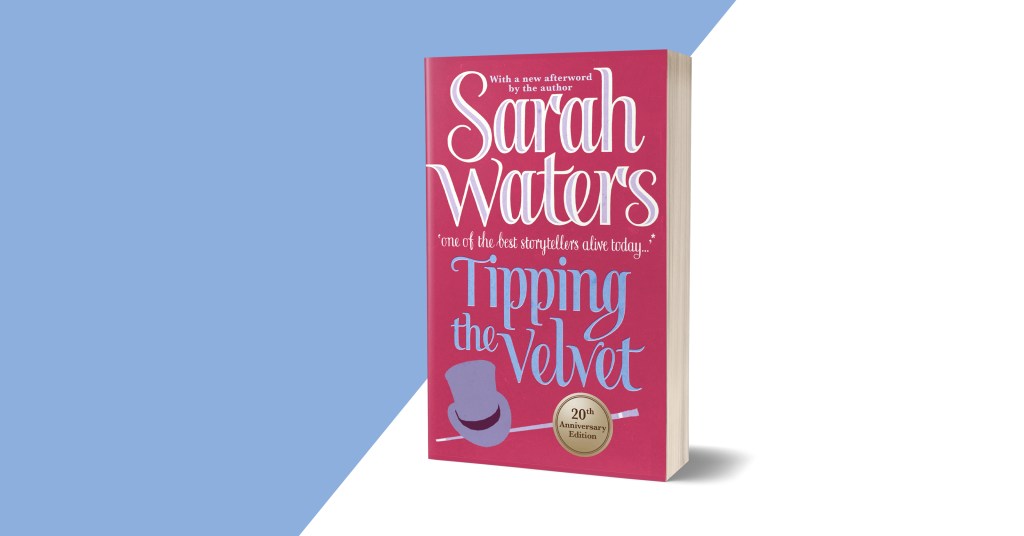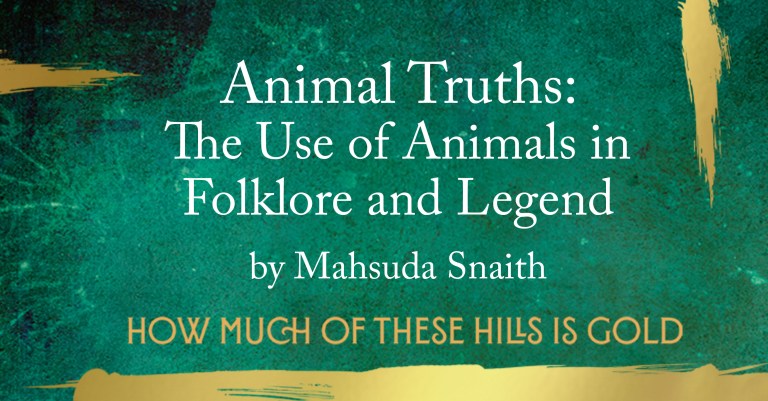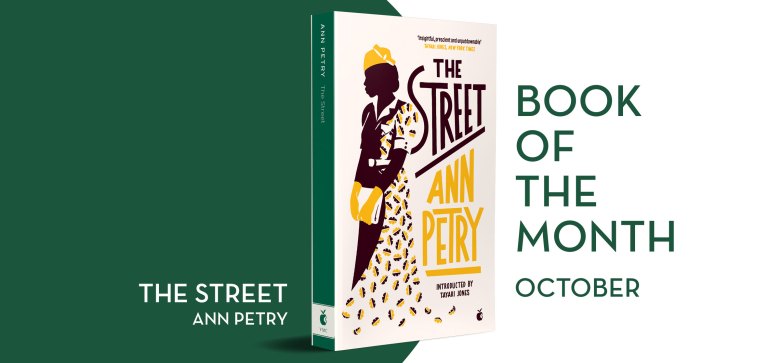Pride 2020 | An Extract from Sarah Waters’ Tipping the Velvet

Read an extract from the true classic that is Sarah Waters’ Tipping the Velvet. A saucy, sensuous and multi-layered historical romance, Tipping the Velvet follows the glittering career of Nan King – oyster girl turned music-hall star turned rent boy turned East End ‘tom’. Sarah Waters was born in Wales. She has won a Betty Trask Award, the Somerset Maugham Award and her books have been shortlisted for the Man Booker Prize and the Orange Prize. Tipping the Velvet, Affinity, Fingersmith and The Night Watch have been adapted for television. Sarah Waters has been named Author of the Year four times: by the British Book Awards, the Booksellers’ Association, Waterstone’s Booksellers and the Stonewall Awards. She lives in London. She was awarded an OBE in 2019.
‘She is an extremely confident writer, combining precise, sensuous descriptions with irony and wit. This is a lively, gutsy, highly readable debut’ Observer
* * *
‘Ladies and gentlemen,’ he cried, ‘a little treat for you now. A little bit of helegance and top-drawer style. If you’ve cham- pagne in your glasses’ – there was an ironical cheering at this – ‘raise them now. If you’ve beer – why, beer’s got bubbles, don’t it? Raise that too! Above all, raise your voices, as I give to you, direct from the Phoenix Theatre, Dover, our very own Kentish swell, our diminutive Faversham masher . . . Miss Kitty’ – clack! – ‘Butler!’
There was a burst of handclapping and a few damp whoops. The orchestra struck up with some jolly number, and I heard the creak and whisper of the rising curtain. All unwill- ingly I opened my eyes – then I opened them wider, and lifted my head. The heat, my weariness, were quite forgotten. Piercing the shadows of the naked stage was a single shaft of rosy limelight, and in the centre of this there was a girl: the most marvellous girl – I knew it at once! – that I had ever seen.
Of course, we had had male impersonator turns at the Palace before; but in 1888, in the provincial halls, the masher acts were not the things they are today. When Nelly Power had sung ‘The Last of the Dandies’ to us six months before she had worn tights and bullion fringe, just like a ballet-girl – only carried a cane and a billycock hat to make her boyish. Kitty Butler did not wear tights or spangles. She was, as Tricky had billed her, a kind of perfect West End swell. She wore a suit – a handsome gentleman’s suit, cut to her size, and lined at the cuffs and the flaps with flashing silk. There was a rose in her lapel, and lavender gloves at her pocket. From beneath her waistcoat shone a stiff-fronted shirt of snowy white, with a stand-up collar two inches high. Around the collar was a white bow-tie; and on her head there was a topper. When she took the topper off – as she did now to salute the audience with a gay ‘Hallo!’ – one saw that her hair was perfectly cropped.
It was the hair, I think, which drew me most. If I had ever seen women with hair as short as hers, it was because they had spent time in hospital or prison; or because they were mad. They could never have looked like Kitty Butler. Her hair fitted her head like a little cap that had been sewn, just for her, by some nimble-fingered milliner. I would say it was brown; brown, however, is too dull a word for it. It was, rather, the kind of brown you might hear sung about – a nut-brown, or a russet. It was almost, perhaps, the colour of chocolate – but then chocolate has no lustre, and this hair shone in the blaze of the limes like taffeta. It curled at her temple, slightly, and over her ears; and when she turned her head a little to put her hat back on, I saw a strip of pale flesh at the nape of her neck where the collar ended and the hairline began that – for all the fire of the hot, hot hall – made me shiver.
She looked, I suppose, like a very pretty boy, for her face was a perfect oval, and her eyes were large and dark at the lashes, and her lips were rosy and full. Her figure, too, was boy-like and slender – yet rounded, vaguely but unmistakably, at the bosom, the stomach and the hips, in a way no real boy’s ever was; and her shoes, I noticed after a moment, had two- inch heels to them. But she strode like a boy, and stood like one, with her feet far apart and her hands thrust carelessly into her trouser pockets, and her head at an arrogant angle, at the very front of the stage; and when she sang, her voice was a boy’s voice – sweet and terribly true.
Her effect upon that over-heated hall was wonderful. Like me, my neighbours all sat up, and gazed at her with shining eyes. Her songs were all well-chosen ones – things like ‘Drink Up, Boys!’ and ‘Sweethearts and Wives’, which the likes of
- H. Macdermott had already made famous, and with which we could all, in consequence, join in – though it was peculiarly thrilling to have them sung to us, not by a gent, but by a girl, in necktie and trousers. In between each song she addressed her- self, in a swaggering, confidential tone, to the audience, and exchanged little bits of nonsense with Tricky Reeves at his chairman’s table. Her speaking voice was like her singing one – strong and healthy, and wonderfully warm upon the ear. Her accent was sometimes music-hall cockney, sometimes theatri- cal-genteel, sometimes pure broad Kent.
Her set lasted no longer than the customary fifteen minutes or so, but she was cheered and shouted back on to the stage at the end of that time twice over. Her final song was a gentle one – a ballad about roses and a lost sweetheart. As she sang she removed her hat and held it to her bosom; then she pulled the flower from her lapel and placed it against her cheek, and seemed to weep a little. The audience, in sympathy, let out one huge collective sigh, and bit their lips to hear her boyish tones grow suddenly so tender.
All at once, however, she raised her eyes and gazed at us over her knuckles: we saw that she wasn’t weeping at all, but smiling – and then, suddenly, winking, hugely and roguishly. Very swiftly she stepped once again to the front of the stage, and gazed into the stalls for the prettiest girl. When she found her, she raised her hand and the rose went flying over the shimmer of the footlights, over the orchestra-pit, to land in the pretty girl’s lap.
We went wild for her then. We roared and stamped and she, all gallant, raised her hat to us and, waving, took her leave. We called for her, but there were no more encores. The curtain fell, the orchestra played; Tricky struck his gavel upon his table, blew out his candle, and it was the interval.
I peered, blinking, into the seats below, trying to catch sight of the girl who had been thrown the flower. I could not think of anything more wonderful, at that moment, than to receive a rose from Kitty Butler’s hand.
I had gone to the Palace, like everyone else that night, to see Gully Sutherland; but when he made his appearance at last – mopping his brow with a giant spotted handkerchief, com- plaining about the Canterbury heat and sending the audience into fits of sweaty laughter with his comical songs and his face-pulling – I found that, after all, I hadn’t the heart for him. I wished only that Miss Butler would stride upon the stage again, to fix us with her elegant, arrogant gaze – to sing to us about champagne, and shouting ‘Hurrah!’ at the races. The thought made me restless. At last Alice – who was laughing at Gully’s grimaces as loudly as everybody else – put her mouth to my ear: ‘What’s up with you?’
‘I’m hot,’ I said; and then: ‘I’m going downstairs.’ And while she sat on for the rest of the turn, I went slowly down to the empty lobby – there to stand with my cheek against the cool glass of the door, and to sing again, to myself, Miss Butler’s song, ‘Sweethearts and Wives’.
Soon there came the roars and stamps that meant the end of Gully’s set; and after a moment Alice appeared, still fanning herself with her bonnet, and blowing at the dampened curls which clung to her pink cheeks. She gave me a wink: ‘Let’s call on Tony.’ I followed her to his little room, and sat and idly twisted in the chair behind his desk, while he stood with his arm about her waist. There was a bit of chat about Mr Sutherland and his spotted handkerchief; then, ‘What about that Kitty Butler, eh?’ said Tony. ‘Ain’t she a smasher? If she carries on tickling the crowd like she did tonight, I tell you, Uncle’ll be extending her contract till Christmas.’
At that I stopped my twirling. ‘She’s the best turn I ever saw,’ I said, ‘here or anywhere! Tricky would be a fool to let her go: you tell him from me.’ Tony laughed, and said he would be sure to; but as he said it I saw him wink at Alice, then let his gaze dally, rather spoonily, over her lovely face.
I looked away, and sighed, and said quite guilelessly: ‘Oh, I do wish that I might see Miss Butler again!’







